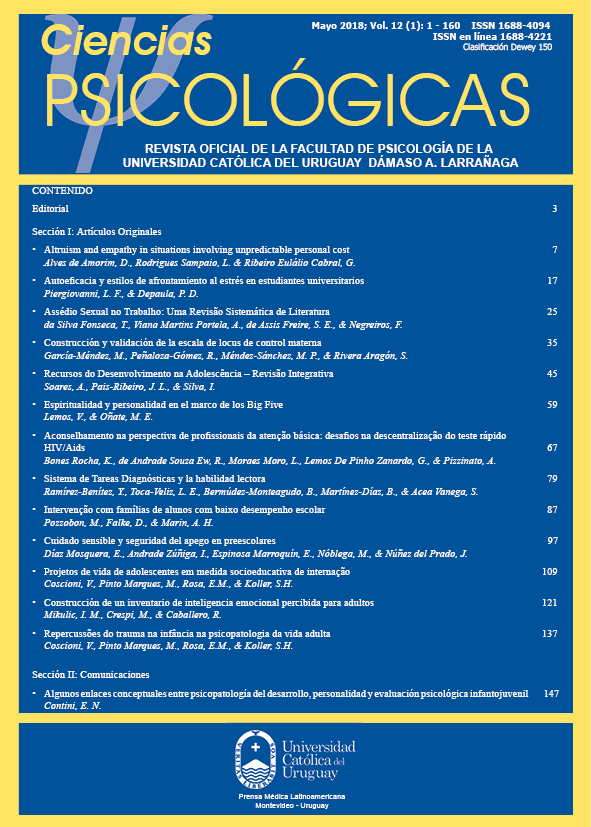Self-efficacy and stress coping styles in university students
DOI:
https://doi.org/10.22235/cp.v12i1.1591Keywords:
self-efficacy, stress coping styles, university students, stress, locus controlAbstract
The present investigation analyzed the relationship between the levels of Self efficacy that students of the bachelor´s degree on Psychology have and the Coping Styles that they use to face internal or external requests. A sample of 126 students was selected. They were given the General Self Efficacy Scale, the Coping Strategies Questionnaire and a social demographic questionnaire. The results show that those students that have more Self-efficacy use the Coping Strategy focused on solving the problem and Positive reappraisal. On the other hand, students that have lower Self-efficacy levels use the Negative self-blameway of coping with stress.
Downloads
References
Bandura, A. (1997). Self-efficacy: The exercise of control. New York, NY: Freeman.
Bandura, A. (1999). (Ed.), Auto-Eficacia: Cómo afrontamos los cambios de la Sociedad actual. Bilbao: Desclée de Brouwer.
Bandura, A. (2002). Social cognitive theory in cultural context. Applied Psychology: An International Review, 51, 269-290. doi: 10.1111/1464-0597.00092
Bandura, A. (1986). Social foundations of thought and action: A social cognitive theory. Englewood Cliffs, NJ: Prentice Hall.
Borzone Valdebenito, M. A. (2017). Autoeficacia y vivencias académicas en estudiantes universitarios. Acta Colombiana de Psicología, 20(1), 266-274. doi: 10.14718/ACP.2017.20.1.13
Brenlla, M. E., & Infante Geronimi, C. (2008). Adaptación Argentina de la Escala Breve de Afrontamiento al Estrés de Carver. Manuscrito no publicado.
Brenlla, M. E., Aranguren, M., Rossaro, M. F., & Vázquez, N. (2010). Adaptación para Buenos Aires de la Escala de Autoeficacia General. Interdisciplinaria, 27(1), 77-94.
Brenlla, M. E., Vázquez, N., & Aranguren, M. (2008). Adaptación Argentina de la Escala de Locus de Control de Rotter. Manuscrito no publicado.
Carver, C. S. (1997). You want to measure coping but your protocol’s too long: Consider the BRIEF COPE. International Journal of Behavioral Medicine, 4(1), 92-100.
Cohen, J. (1992). A power primer. Psychological Bulletin, 112(1), 155-159. doi: 10.1037/0033-2909.112.1.155
Farchi, M., Cohen, A., & Mosek, A. (2014). Developing Specific Self-Efficacy and Resilience as First Responders among Students of Social Work and Stress and Trauma Studies. Journal of Teaching in Social Work, 34, 129-146. doi: 10.1080/08841233.2014.894602
Hernández Sampieri, R., Fernández-Collado, C., & Baptista Lucio, P. (2006). Metodología de la investigación. México: McGraw-Hill.
Jerusalem, M., & Schwarzer, R. (1992). Self-efficacy as a resource factor in stress appraisal processes. In R. Schwarzer (Ed.), Self-efficacy: Thought control of action (pp. 195-213). Washington, DC: Hemisphere.
Lazarus, R. S., & Folkman, S. (1987). Transactional theory and research on emotions and coping. European Journal of Personality, 54, 385-405.
Lazarus, R.S., & Folkman, S. (1986). Estrés y procesos cognitivos. Barcelona: Editorial Martínez Roca.
Lazarus, R.S., & Folkman, S. (1984). Stress, Appraisal and Coping. New York: Springer Publishing Company.
Matheny, K.B., Aycock, D.W., Pugh, J.L., Curlette, W.L., & Silva-Cannella, K.A. (1986). Stress Coping: A Qualitive and Quantitive Synthesis with Implications for Treatment. Counselling Psychologist, 14, 499-549.
Meyer, G. J., Finn, S. E., Eyde, L. D., Kay, G. G., Moreland, K. L., Dies, R. R., ... Reed, G. M. (2001). Psychological testing and psychological assessment: A review of evidence and issues. American Psychologist, 56(2), 128-165. doi: 10.1037/0003-066X.56.2.128
Mok, E., & Tam, B. (2001). Stressors and Coping Methods among Chronic Haemodialysis Patients in Hong Kong. Journal of Clinical Nursing, 10, 503-511.
Moretti, L.S., Medrano, L.A., & Basler, H. (2015). Validación del Cuestionario de Lugar de Control de Dolor en estudiantes argentinos con cefaleas recurrentes. Pensamiento Psicológico, 13(1), 27-38. doi: 10.11144/Javerianacali.PPSI13-1.vclc
Pajares, F. (2002). Overview of Social Cognitive Theory and Self-Efficacy. EE.UU: Emory University.
Quintero Montelongo, M. A., Pérez Córdoba, E., & Correa Gutiérrez, S. (2009). La relación entre la autoeficacia y la ansiedad ante las ciencias en estudiantes del nivel medio superior. Revista Internacional de Ciencias Sociales y Humanidades, 19(2), 69-91.
Richardson, C., & Poole, H. (2001). Chronic pain and coping: a proposed role for nurses and nursing models. Journal of Advanced Nursing, 34, 659-667. doi: 10.1046/j.1365-2648.2001.01795.x
Richaud, M. C. (2007). La ética en la investigación psicológica. Enfoques, 19, (1-2), 5-18.
Rotter, J. B. (1966). Generalized expectancies for internal versus external control of reinforcement. Psychological Monographs, 80, 1-28.
Ruus, V., Veisson, M., Leino, M., Ots, L., Pallas, L., Sarv, E., & Veisson, A. (2007). Students’ Well-Being, Coping, Academic Success, and School Climate. Social Behavior and Personality, 35(7), 919-936. doi: https://doi.org/10.2224/sbp.2007.35.7.919
Sandín, B. (2003). El estrés: un análisis basado en el papel de los factores sociales. Revista Internacional de Psicología clínica y de la salud, 3(1), 141-157.
Sandín, B., & Chorot, P. (2003) Cuestionario de afrontamiento del estrés (CAE): desarrollo y validación preliminar. Revista de Psicopatología y Psicología Clínica, 8(1), 39-54.
Schunk, D.H. (1989). Self-efficacy and Achievement Behaviors. Educational Psychology Review, 1(3), 173-207. doi: 10.1007/BF01320134
Visdómine-Lozano, J.C., & Luciano, C. (2006). Locus de control y autorregulación conductual: revisiones conceptual y experimental. International Journal of Clinical and Health Psychology, 6, 729-751.
















